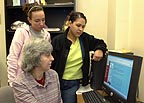February 02, 2007
Trisomy 18 Project helps parents of children with rare disorder
Caption follows story
(PRONOUNCERS: "trisomy" is "TRY-sum-ee;" "Bruns" is pronounced like the first syllable in "Brunswick")CARBONDALE, Ill. — A survey of parents whose children have an extra chromosome will churn out not just facts but hope, its developer believes.
"Seven or eight years ago, if you Googled Trisomy18 (shorthand for the presence of a third chromosome on the 18th pair), all you would find would be autopsy photos," said Deborah A. Bruns, assistant professor in the educational psychology and special education department at Southern Illinois University Carbondale.
"We hope that our survey will generate data that will get out to both professionals and families to offset that gloom-and-doom scenario. There are children who survive, and they're doing well."
Bruns, who joined SIUC's College of Education and Human Services faculty in 2003, became interested in the disorder during a stint in a skilled nursing center. While working with young children with severe disabilities, the newly minted special ed teacher found she had not one but three such children in class.
"I did a little research and found there wasn't a lot about them," she recalled.
"They have cardiac problems and respiratory and GI (gastro-intestinal) problems — only 10 percent live to a year. But when these children were in my classroom, two were 3 going on 4 and one was 4 going on 5, so I was sure there had to be other kids like them."
Because Bruns went looking, she found them, first through a conference she attended where special education teachers talked about older kids, and then through an Internet group moderated by the Australian mother of an older boy. The discussions generated on the Web really got to her.
"People would come and go, but the same issues kept coming up," Bruns recalled.
"Because doctors and other professionals saw these children as 'hopeless' cases, medical help and other interventions and services often weren't readily offered or given.
"The parents kept saying, 'Something needs to be done,' and I decided that when I was connected with a university and had the letters after my name that would make people take me seriously, I would do something."
Bruns' "something" is the TRIS project, an acronym that stands for "tracking rare incidence syndromes."
The project, which models itself as a resource for information on family services, treatment options, educational assistance and other such supports, began in 2004. It has received funding from SOFT (Support Organization for Trisomy 18, 13 and Related Disorders), Trisomy 18 Support Foundation Inc. and Noah's Never-Ending Rainbow, a national non-profit group formed by the Wisconsin aunt of a baby with a form of the disorder who died at the age of 7 months.
The project also has its own Web site, www.coehs.siu.edu/tris, where, in addition to facts and figures, Bruns posts pictures of both living children and "angels," the parents' preferred term for those who have died.
"I contact the parents about posting the pictures so people can see them and see that there are those who survive — 85 percent of these kids pictured on the site since it began in September 2005 are living," Bruns said.
"Last summer, I went to a SOFT conference in Oakbrook and met this group of girls with trisomy 18 (all of whom are) 10 years old and above."
The TRIS survey, put through its paces last summer and then re-tweaked, will serve as the prime information-gathering tool for the TRIS project when it is launched online this month.
"It has three sections," Bruns said. "It's a monster — very long but very comprehensive."
The first section, which collects parents' demographic information, also touches on their experiences with pregnancy and birth. The second deals with family relationships and support systems. The third focuses on medical conditions and therapeutic needs, specialists, educational programming and developmental milestones.
That last feature should provide both help and hope to parents as results are posted and periodically updated.
"Parents need to know their children are not going to be lifeless lumps — and I want to give these kids credit for what they can do," Bruns said.
"For instance, your child might not walk the way other kids walk, but when you see these behaviors, maybe it's time to go to a physical therapist and see if he's ready to get a gait trainer."
Parents who wish to take part in the survey will first register at the Web site. They can then fill it out at their leisure — all at once, or in bits and pieces, as their schedules allow. Bruns and her two research assistants, graduate student Evelyn Barrientos-Perkins and junior Emma Markhausen, will assist with analysis and post the responses each month. Eventually, Bruns hopes to have both survey and findings translated into other languages.
"We want this to have a global reach," she said.
She also plans on publishing the research and presenting it at conferences focusing on chromosomal disorders, early childhood and professional development.
"That 'knowledge is power' thing is what it comes down to," Bruns said.
"If nothing else, this will let families have a truer picture of what awaits them, and it will give medical, educational and therapeutic professionals a better understanding."
(Caption: Trisomy three — Flanked by Southern Illinois University Carbondale student researchers (standing, from left) Emma K. Markshausen and Evelyn Barrientos, Assistant Professor Deborah A. Bruns inspects the Web site the three have created on Trisomy 18, a genetic disorder in children. Markshausen, a senior from Capron, is majoring in special education and elementary education. Barrientos, a native of the Dominican Republic, is working toward a master’s degree in curriculum and instruction.)
Photo by Russell Bailey

